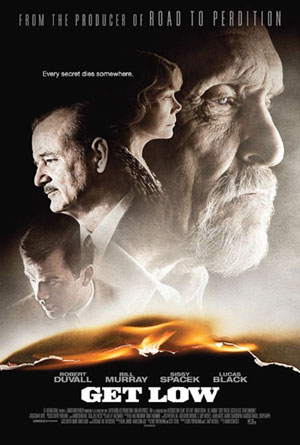Get Low – 3*
 By our very human nature we are fascinated by folklore, especially where wrongdoing or a supernatural element are involved. Our curiosity grows when there is an unresolved factor to the tale, and even a presence or being in the frame.
By our very human nature we are fascinated by folklore, especially where wrongdoing or a supernatural element are involved. Our curiosity grows when there is an unresolved factor to the tale, and even a presence or being in the frame.
Debut feature maker Aaron Schneider’s Get Low is based on one such Southern yarn about a real-life loner Felix ‘Bush’ Breazeale from Kingston, Tennessee in the 1930s who had a reputation for being eccentric, wild and dangerous, fuelled by the fact that he chose to live alone with his beloved mule. Bush wanted to know what people would say about him after he was gone – and especially the preacher, so arranged a living funeral, which drew national interest on the offer of lottery tickets for his valuable land. He died a couple of years later, taking the secret of his one true love to the grave.
As a film concept, it is an exciting one, full of possibilities. Schneider is considerate to the legend by getting the casting of his Bush just right in the equally legendary Robert Duvall who fully fleshes out the tired and crusty Bush with little effort. Whether the truer, uglier aspects of the real-life character are missing from this and tamed down is hard to tell, but Duvall’s Bush merely seems like a harassed old man with a shady past and an exceptional beard, simply wanting to be left alone in his latter years. Our empathy with that is vitally important for Schneider’s film to work and is tactfully sown from the start, especially when some pesky youths come a snooping on Bush’s land.
Indeed, be prepared for a slow burner of realisation and redemption that in turn allows for its multitude of colourful characters to evolve in a touching and comical way. It is absolutely a character-driven film with a hint of western theme, so placing an experienced actor like Duvall in the lead to drive the mystery was a wise and necessary choice. To match Duvall’s guarded and, at times, muted delivery needs a wit-matching catalyst of talent. Bill Murray injects the humour with his own brand of thrilling deadpan and nonchalant precision as the local, money-grabbing funeral home owner, Frank Quinn.
It feels like an odd partnership at first as we expect Murray to lead us done the farcical comedy path, as Quinn runs ragged around town and the state trying to host the biggest party ever. These are some of the joyous and memorable scenes of the film, especially getting Bush’s picture taken. But Murray retains his serious composure, making salesman Quinn and his calculating ways far more amusing to watch, and bringing a whole new dimension to the character. Quinn gains a healthy bank balance, but also heart, a place in the local community (as an out-of-towner from the big city, Chicago), and a purpose in life that the liquor-swilling boss craves. It is an intriguing journey in itself. However, slightly disappointingly, the character is left woefully unexplored, with Schneider preferring to cut dead any development in that respect to focus the story on his lead protagonist. This results in Quinn never rising above his comedy caricature.
Bush’s manipulating ways are exposed by Quinn’s by-the-book protégée, Buddy Robinson, who sees life in the old dog Bush yet. Robinson is the film’s human barometer, the voice of reason and the new blood in the situation. The ever scornful-looking and brow-furrowed Lucas Black nicely takes on the role with an attentive and determined manner, becoming the surrogate family Bush never had. Both Robinson and Bush’s old flame, Mattie, refuse to allow Bush to fester in his lot and shy away from society, gently coaxing out his dormant humanity, emotion and generosity of spirit. Sissy Spacek as Mattie gives her usual solid and tormented performance as the victim of unrequited love. Opposite Duvall, their appearances and acute facial expressions are compelling to watch as the mystery of Bush’s hermitage unfolds.
Indeed, Mattie is a fictional character and not part of the real-life tale. She has been created to allow Schneider to take the easy option out by revealing the mystery with a heart-felt, beans-spilling and rather theatrical ending, rather than opting for the trickier one of retaining some of Bush’s enigma, and giving the film a nice little twist. Admittedly, Duvall is always captivating to watch, giving one of his momentous screen speeches that is spoiled with the visual flashbacks for the hard-of-thinking. Hence, the reveal seems a little deflating and unsatisfactory an explanation as to his choice of lifestyle. By withholding some of his true feelings and intentions, Schneider could have concluded the film on an unnerving edge, allowing for the imagination to run wild and keeping the folklore in tact. Still, we get to respect and warm to Bush in the end, and in turn, give him a hero’s send off.
Get Low is a quirky and touching tale of the power of storytelling that completely relies on its rich character strength to see it to fruition. Its appeal lies solely on Duvall as Bush, even though his intrigue that is so brilliantly built up in the first half, somewhat crumbles in the second half, when the mystery comes flooding out in a weepy confessional. If nothing else, Duvall makes Bush iconic in stature, prompting a genuine sigh at the old man’s passing and the tragedy of time lost. It is a safe bet in feature film-making for Schneider who should be credited alone for attracting a stellar cast, as well as an apt platform for reintroducing the exceptional acting veteran Duvall as a leading protagonist, after many years away from centre stage.
3/5 stars
By @FilmGazer